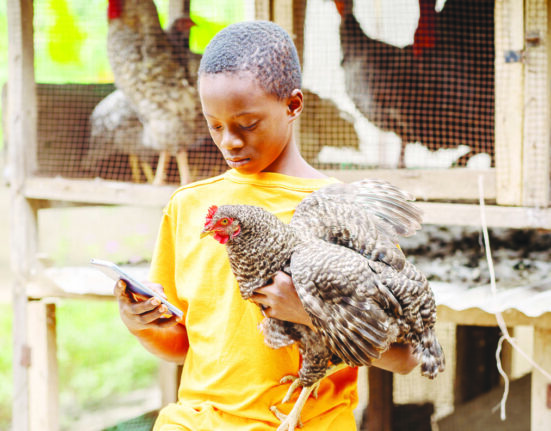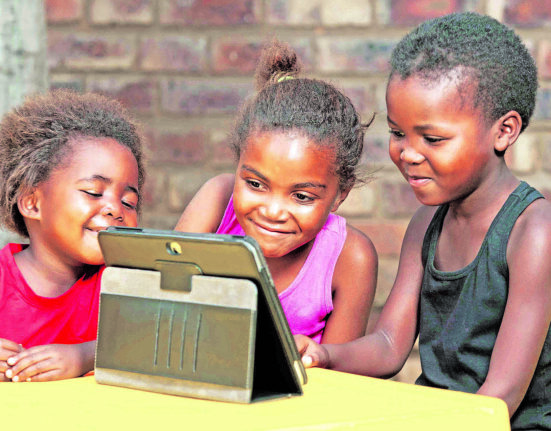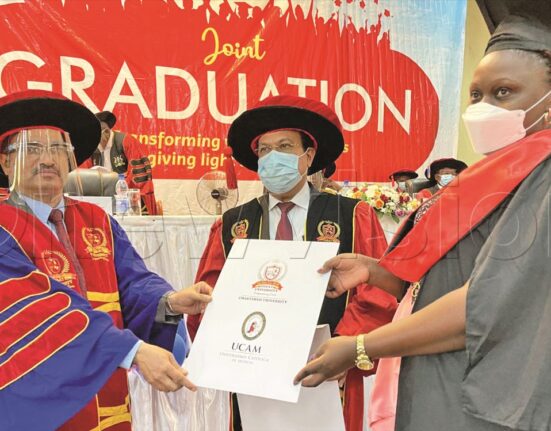(Published on Wednesday, December 22, 2021)
By Vision Reporter

The Government is still committed to offering support to academic institutions to ensure that they re-open, according to the state minister for higher education, Dr John Chrysostom Muyingo.
Dr Muyingo says the Government has already released funds to schools ahead of the reopening.
The minister made the remarks last week, while officiating at the 14th graduation of ISBAT University. At the ceremony, 350 students graduated with bachelor’s and master’s degrees.
Muyingo, who was flanked by the Minister of State for Planning, Amos Lugoloobi, as the guest speaker, also lauded ISBAT University for ensuring continuity of learning during the COVID-19 pandemic.
The chairperson of ISBAT University board of directors, Varghese Mundamattam, in his speech, thanked the minister for the support Government has rendered not only to ISBAT, but also other academic institutions over the years.
Mundamattam, however, noted that several academic institutions are struggling to keep afloat due to the negative effects of the pandemic and that some of the institutions have closed.
In response, Muyingo said the Government is committed to supporting education institutions that are still afloat, to overcome the negative effects of the pandemic, in various ways, which do not have to be monetary.
“We want to see the re-opening of schools and other academic institutions, done well. The finance ministry has already released the money to us and we have also held discussions with various entities and we will do our best to support the academic institutions,” he explained.
Since July 2021, the Government has availed over sh107b in capitation grants to its institutions at all levels, that is, primary, secondary, tertiary and special needs education institutions.
Records from the education ministry also show that for government-aided primary and secondary schools, about sh62b of the capitation grants have been earmarked for the restoration of these schools by way of minor repairs and face-lifting. Part of the funds are also used in the purchase of basic amenities for observance of COVID-19 standard operating procedures.
Dr Muyingo’s remarks followed the First Lady and education minister, Mrs Janet Museveni’s remarks, in her earlier briefing last week, that there was a commitment from Government to support all education institutions in monetary and other ways.
For government-aided education institutions, the First Lady says, “We have ensured that all our staff who are on the payroll continue to receive their monthly salary even when teaching was not taking place in schools.
“We are aware that this fortune has not been the same for private education institutions. Therefore, we do expect that all vaccinated staff in government-aided education institutions report for duty upon re-opening,” Mrs Museveni said.
The First Lady said some schools may not be in a position to receive a facelift because they are not plastered, or the existing structures need a considerable amount of repair before face-lifting.
“We are working with local governments to see to those decisions,” she explained.
She also revealed: “The Government has agreed with the Ministry of Local Government that such schools shall be identified, and the School Facilities Grant of Financial Year 2022/2023 shall be prioritized by the respective local governments to improve such structures so that they can also receive a facelift once the major repairs have been undertaken.”
She also noted that 51 schools were devastated by natural disasters. “Some schools are going to be provided with temporary facilities to enable continuity of learning upon re-opening. However, some simply need permanent relocation and complete construction of new infrastructure,” Mrs Museveni explained.
“Such arrangements for permanent solutions are out-of-scope for re-opening interventions by January 2022. Instead, we shall work with other sectors of government to identify funds and suitable places to relocate these schools. In the meantime, parents are encouraged to take learners from these affected schools to the nearest affordable school of their choice,” she explained.
Support To Private Education Institution
- Bank of Uganda issued an extension of all COVID-19 relief measures to the education and hospitality sectors for one more year, starting September 2021.
- UMEME has agreed to give schools a grace period of 12 months to pay any outstanding electricity bills.
- National Water and Sewerage Cooperation is looking into waiving the non-V.A.T. fees for outstanding bills for schools from March 2020 to the time of re-opening. In addition, they are looking at the possibility of discounting the cost of a jerrycan of water to perhaps as low as sh25 at public water points that serve schools. NWSC has promised the education ministry that they will look into the possibility of connecting schools to the national water grid at no cost as long as the school is within the coverage area.
- Uganda Revenue Authority (URA) said they did waive all tax penalties and arrears up to June 2020 for all businesses (of which private education institutions are a part of this category).
- URA has agreed with the education ministry that schools that have credit liabilities may approach the agency and negotiate flexible repayments. URA has also waived the 12% excise duty on internet data for all education and health institutions.
- Financial Institutions: Relief measures for schools have already been put in place. For example, Stanbic Bank has fully waived all accrued interest on loans to schools for the year 2021.
- Some banks are willing to lend to private schools interventional working capital at reduced rates








Leave feedback about this